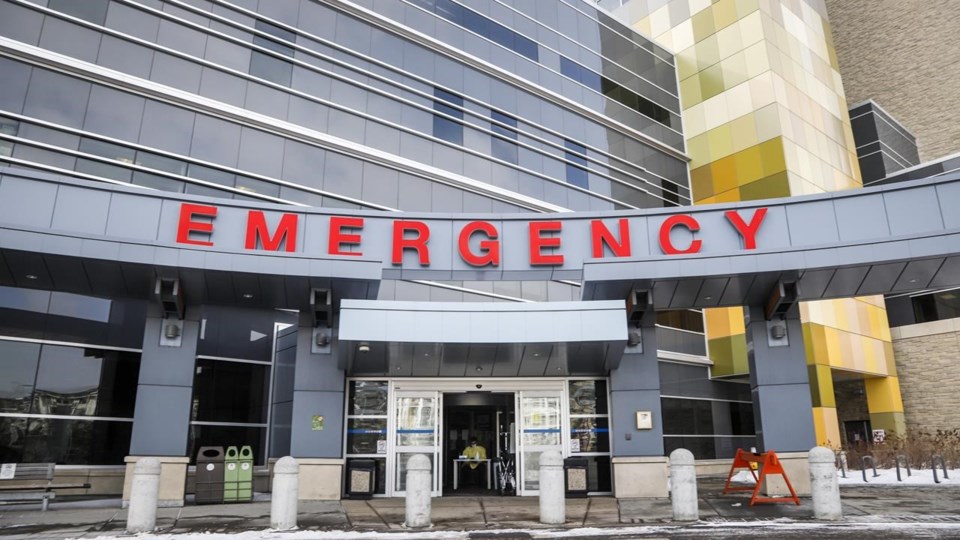CALGARY — It's one of the key issues at the ballot box in the Alberta election, but the two main rivals vying to run the province's sprawling health system can't agree on the diagnosis, let alone the cure.
The provincial election is on Monday.
United Conservative Leader Danielle Smith says that on her watch as premier, surgical wait times have been cut and new rules have reduced ambulance bottlenecks at the doors of emergency wards.
NDP Leader Rachel Notley says Smith needs to put down the spreadsheet and take a look around: hourly wait times are in the double digits at emergency wards, including 11 hours at the Red Deer Regional Hospital in central Alberta this past weekend.
Both sides agree that there's more work to do as Alberta's health system, like others across Canada, faces worker shortages amid the aftershocks of the COVID-19 pandemic.
"Health care is a disaster and I don't think that's unique here. It's across the country," said Dr. Fredrykka Rinaldi, president of the Alberta Medical Association.
"There's a shortage of health-care professionals … there's about 650,000 Albertans without a family physician, which means they go to the ER, which is way more expensive."
The parties, she said, must address the cause, not the symptoms.
The association, which represents doctors, came up with seven "pain points" facing the health-care system: primary care, human resources, the drug poisoning crisis, mental health, care of the elderly, rural health and Indigenous health.
On Wednesday, more than 180 Calgary emergency room doctors put out a letter raising their concerns.
"Signs of a capacity crisis are everywhere," said the letter. "The wait time in Calgary emergency departments has skyrocketed, with patients sometimes waiting up to 15 hours to be seen by a doctor. These patients often become sicker while waiting. We worry about these patients every shift."
Rinaldi, a family doctor in Medicine Hat, said there's also often no followup care after an emergency department visit. In addition, she said pediatric patients are waiting longer for mental health care and there are long wait lists for specialists and surgeries.
"We can blame COVID for part of this, but part of this is the chronic underfunding of community care," she said.
"There are no immediate answers, but there have to be answers that are progressive going forward."
Rinaldi said some provinces, including Saskatchewan, Manitoba and Newfoundland, appear to be finding solutions.
Pollsters have said health care, along with the economy and trust, are key issues with Alberta voters.
Notley has said health care deteriorated badly under the UCP government. She has promised to spend $400 million to hire more health workers and $350 million to create 40 teams of health specialists to provide more comprehensive primary care provincewide if her party is elected.
"Our health care has been thrown into chaos by the UCP," Notley said earlier in the campaign. "(The UCP) will tell you they fixed it, but Albertans aren't feeling it and they're not buying it."
Many issues were related to COVID-19, Notley said, but Alberta's problems have been exacerbated by the UCP's policy decisions, including wage fights with doctors and nurses during the pandemic, and creating chaos by firing the board of Alberta Health Services and the chief medical officer of health.
The UCP government replaced the AHS board with a single administrator. Smith has said streamlined decision-making and adding more chartered surgical facilities has allowed the province to substantially reduce those backlogs.
"We talked to doctors and nurses and paramedics on the front lines. We listened to them and we implemented their ideas and, guess what, it's working," she said during Thursday's debate.
The two leaders disagree on not only the past, but the future of health care. Both have guaranteed they would not de-list procedures or prescriptions covered by medicare, but the NDP has said the UCP promise is fragile.
Smith has declined to disavow statements made in 2021 when she advocated for out-of-pocket payments for medical services such as seeing a family doctor. She has countered by saying she's moved on from her past comments and committed to public health care — even signing a long-term funding deal with Ottawa.
In her first month as premier, she said the unvaccinated were the most discriminated people she'd seen in her lifetime. And earlier, she compared those who got vaccinated for COVID-19 to Nazi supporters.
Smith has also said she would bring in a bill forcing people with severe drug addiction into treatment.
Lorian Hardcastle, an assistant professor at the University of Calgary specializing in health law and policy, said Smith seems to make decisions based in ideology rather than in evidence when it comes to issues such as the pandemic response and the drug poisoning crisis.
That could be having a domino effect in recruiting, Hardcastle said.
"Health professionals are scientists," she said.
"We want to make it as an appealing a place as possible to work and I don't think that a place that doesn't follow the evidence and where the government seems determined to focus more on ideology than on evidence is one that health professionals want to work in."
However, she said the leaders face challenges from voters on both sides. Some want to protect the public health system, while others thought COVID-19 restrictions were too restrictive or see a role for privatization.
"For many people, (health) will be one of the deciding issues for them in the election."
— With files from Dean Bennett in Edmonton
This report by The Canadian Press was first published on May 24, 2023.
Colette Derworiz, The Canadian Press



